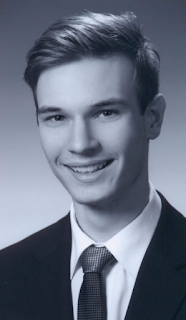Gábor Erős is a student of the Mechatronics Engineering MA program of BME Faculty of Mechanical Engineering. Despite this, he wrote his TDK (Student’s Scientific Association Conference) paper about how exchange rate changes affect the 2008 financial crisis. Although the author studies at a different faculty, the article was awarded the 1st prize in the economic sciences section and the Farkas Heller Special Award for the moral recognition of creating outstanding work. Interview.
You study mechatronics engineering. Still, you decided to analyse exchange rate changes in your TDK paper. Why?
Data around us, and
the information and opportunities inside, has always interested me. It is a
topic that is hard to describe or imagine, but perhaps, this specifically made
research exciting and full of challenges, engrossing me.
Last year, at the Mathematics of stochastic systems course, I met network theory, and with my lecturer, future supervisor, Dr Edith Kovács, we decided to work together.
We started examining portfolio trading with regressive and neural networks. When I began to dig deep, I parallelly started to narrow down the actual subject, ending up with data analysis of exchange rates and its financial crisis application.
Finally, how can crises be predicted?
In the network of exchange rates, we found specific relation-wise behaviour and immediately preceding abnormal movements. What stands out with this model, that not only crises but regression or change of economic performance can be predicted. We used reference data for examination, and in multiple event-period combinations, the model made a signal.
In what ways could your studies support your research?
The substantial grounds in mathematics gained at BME Faculty of Mechanical Engineering helped me in various fields, e.g. research and interpretation of literature and creating new models. I could also highlight programming since the problem’s object-oriented coding was a complex, challenging process.
What I can underline the most is the analytical and abstract approach gained at BME. For instance, how to start working on an unknown problem and how to process it or interpret the results correctly and make decisions at critical points. While the abstract approach helped me think out of the box, not be stuck in the existing models and their errors but to question them and seek the ’how-to-make-it-another-way’ methods.
To sum it up, I would highlight the approach and persistence gained at BME Faculty of Mechanical Engineering, which are essential for good work.
Why did you choose BME Faculty of Mechanical Engineering?
My engineering interest originates from my father, who is a mechanical engineer. I have always been amused by the fact that he can fix everything. I attended Béla III. High School at Baja (a town in Southern Hungary), where I felt mathematics and physics being my strength, which was underpinned by my results. It became evident that I would like to study at the BME Faculty of Mechanical Engineering. Mechatronics interested me for quite a long time, and it is full of scientific challenges.
What are your current
plans?
My most important plan is to finish my masters and create a good quality degree at the Department of Mechatronics, Optics, and Mechanical Engineering Informatics. For later on, I also have job plans. I want to form my life to gain the skills and knowledge to manifest my aim.
László Benesóczky

No comments:
Post a Comment